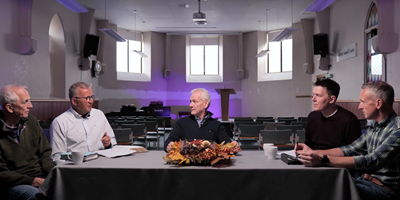Companies spend billions of pounds every year on marketing, striving to understand exactly what people desire and how best to offer it. They thrive on the fallacy that acquiring possessions and experiences can satisfy. However, in reality, no matter how many films are watched, iPhones bought, or food consumed, the promise of satisfaction is never fulfilled.
This age-old dilemma stems back to the beginning of time. In Genesis 3, Satan, the world’s greatest marketing executive, promised mankind ‘true satisfaction’. He told Eve that to gain fulfilment she must eat of the fruit directly forbidden by God. This promise ended not only in disaster and destruction, but ultimately in death for all mankind. Satan continues to captivate millions with his false promise of satisfaction. The Bible calls this captivation sin; Jesus said that anyone who commits sin is a slave to it. Sadly, this is the case for the entire human race, for the Bible says ‘all have sinned and have fallen short of the glory of God’ (Romans 3:23). Satan has been practising this art of deception for millennia; although throughout time his methods may have differed, the result never does.
This begs the question – are freedom and true satisfaction possible? The good news of Jesus Christ and His sacrificial love offers us satisfaction, purpose and contentment, blessings which are found in Him alone.
Two pastures
Into the midst of this sin-dominated world of darkness Jesus came as a beacon of light and hope. When He was here, Christ displayed a remarkable ability to illustrate life’s issues with authority, often leaving His audience amazed. In His teaching about ‘The Good Shepherd,’ Christ likened His hearers to sheep choosing between two guides: a thief who leads only to death and destruction, and Himself leading to life in abundance (John 10:10).
The thief speaks of the world under the control of Satan, holding the flock captive with the inevitable outcome of death and destruction. Today sin, death and destruction are evident everywhere we look. We see broken people, millions needing medication to just get them through the day, broken families with abandoned children, and broken communities and countries. These have become the norm. Jesus’ lesson in this illustration is twofold: first, He highlights the peril of being in the grip of sin; second, He presents Himself as the only true and living hope. He said: ‘I am the door: by me if anyone enters in, he shall be saved and shall go in and out and find pasture’ (John 10:9). What a contrast, and what an offer!
This is what makes Christianity relevant and unique. In a hopeless world, Jesus Christ is the one source of hope, offering deliverance, satisfaction and everlasting life. Jesus described Himself as the door, the entrance into all that humanity needs.
"In a hopeless world, Jesus Christ is the one source of hope, offering deliverance, satisfaction and everlasting life."
One Door
The way to freedom and fulfilment, Jesus claimed, is through Himself alone. He said, ‘I am the door: through Me, if anyone enters in, he will be saved’ (John 10:9). How could He make such an assertion? Does this claim stand up to scrutiny? It does indeed, because of who He is and because of what He has done.
Jesus is God the Son. The Bible tells us that He is the exact imprint or representation of God. Jesus claimed, ‘I and my Father are one’ (John 10:30). Only the all-powerful God can deliver from the power of sin, as the Bible makes abundantly clear. Writing to other Christians about God’s power, Paul the apostle said, ‘When you were dead in your transgressions . . . He made you alive together with Him, having forgiven us all our transgressions’ (Colossians 2:13). When challenged on this very issue, Christ explained that ‘the Son of Man has authority on earth to forgive sins’ (Mark 2:10). Because of who He is, He is well within His rights to make such a claim.
His authority for this declaration goes further than His identity alone. The mission He accomplished on earth gives further credit to the claim. Jesus came into the world to die as a sacrifice, paying the price of sin and procuring freedom. Everything about His life was remarkable, and His death was no exception. Christ voluntarily entered into death. He was not subject to it, nor did it overcome Him; rather, He submitted Himself to death. His death was a sacrifice to God on account of man’s sin. A transaction was carried out and a payment made for the sin of a hopeless world. The Bible says that ‘For our sake He made Him to be sin who knew no sin, so that in Him we might become the righteousness of God’ (2 Corinthians 5:21). Not only that, God raised Him from the dead three days later, certifying the adequacy of the sacrifice. Jesus died and rose again so that we might have freedom from the destructive power of sin, living a life of fulfilment and satisfaction in Him.
Jesus was fully qualified to claim to be the door into life, of that there is no doubt. However, deliverance and fulfilment are conditional. Jesus said that ‘by me if anyone enters in, he shall be saved’ (John 10:9). The individual is responsible to enter this freely open door. A door only provides safety and comfort to those who go through it!
In contrast to the deception of the world, Christ’s offer is sure and certain. Trust in Him and salvation is assured. His invitation to new life offers sustenance and satisfaction, for He said that His sheep ‘go in and out and find pasture’ (John 10:9). No marketing is required here, for this offer sells itself. The marvellous prospect of salvation is open to all: ‘by me if anyone enters in, he shall be saved’ (John 10:9).

































